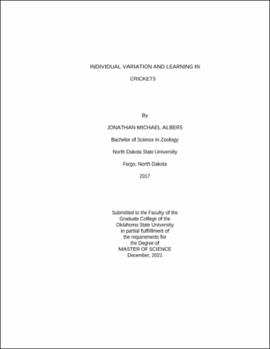| dc.contributor.advisor | Reichert, Michael | |
| dc.contributor.author | Albers, Jonathan Michael | |
| dc.date.accessioned | 2022-05-13T19:05:17Z | |
| dc.date.available | 2022-05-13T19:05:17Z | |
| dc.date.issued | 2021-12 | |
| dc.identifier.uri | https://hdl.handle.net/11244/335778 | |
| dc.description.abstract | Learning can play a key role in an individual's fitness. Learning also often varies among different individuals of the same species, with some individuals being faster learners in different situations such as being better at reversal learning or initial associative learning. There are a variety of factors that might explain such variation, including animal personality. This study aimed to look at how personality traits commonly found on the reactive and proactive axis, such as aggression, neophobia, and latency to exit, affect an individual's learning strategy. In particular, I looked at whether more proactive individuals were faster at learning initial learning, and slower at learning reversals compared to more reactive individuals. I also looked to see if more proactive individuals were less likely to socially learn compared to more reactive individuals. | |
| dc.description.abstract | To test whether different personalities have different learning strategies I used the house cricket, or Acheta domesticus. The crickets, both male and females, ran aggression, novel object, and latency to exit trials. For the learning trials the crickets had to learn to associate two different odors with either a reward or a punishment, and upon learning an association the odors would be switched, so that the reward that was with one odor was then paired with the other odor. There would be two such reversals. Only female crickets were used for the social learning trials, where they were placed in a maze with a stimulus cricket and had to learn to associate an odor that was brushed on the stimulus with a reward. | |
| dc.description.abstract | In the end, no social learning was found in the female crickets. With regards to the personality and learning strategies, it was found that individuals that took longer to exit their shelter were faster reversal learners and faster at initial learning as well. Males were also significantly slower learners in the second reversal compared to the females, while at the same time males were faster learners in the initial learning experiment and the first reversal. The initial learning speed was significantly correlated with the first reversal as well. | |
| dc.format | application/pdf | |
| dc.language | en_US | |
| dc.rights | Copyright is held by the author who has granted the Oklahoma State University Library the non-exclusive right to share this material in its institutional repository. Contact Digital Library Services at lib-dls@okstate.edu or 405-744-9161 for the permission policy on the use, reproduction or distribution of this material. | |
| dc.title | Individual variation and learning in crickets | |
| dc.contributor.committeeMember | Wilder, Shawn | |
| dc.contributor.committeeMember | Abramson, Charles | |
| osu.filename | Albers_okstate_0664M_17461.pdf | |
| osu.accesstype | Open Access | |
| dc.type.genre | Thesis | |
| dc.type.material | Text | |
| dc.subject.keywords | animal personality | |
| dc.subject.keywords | crickets | |
| dc.subject.keywords | information | |
| dc.subject.keywords | learning | |
| dc.subject.keywords | social learning | |
| dc.subject.keywords | variation | |
| thesis.degree.discipline | Integrative Biology | |
| thesis.degree.grantor | Oklahoma State University | |
